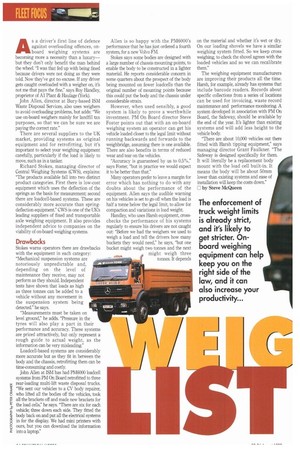The enforcement of truck weight limits is already strict, and
Page 36

If you've noticed an error in this article please click here to report it so we can fix it.
it's likely to get stricter. Onboard weighing equipment can help keep you on the right side of the law, and it can also increase your productivity...
As a driver's first line of defence against overloading offences, onboard weighing systems are becoming more a necessity than a luxury— but they don't only benefit the man behind the wheel. "I was that fed up with being fined because drivers were not doing as they were told. Now they've got no excuse. If any driver gets caught overloaded with a weigher on, it's not me that pays the fine," says Roy Handley, proprietor of Al Plant & Haulage (York).
John Allen, director at Bury-based ISM Waste Disposal Services, also uses weighers to avoid overloading problems, but adds: 'We use on-board weighers mainly for landfill tax purposes, so that we can be sure we are paying the correct rate."
There are several suppliers to the UK market, providing systems as original equipment and for retrofitting, but it's important to select your weighing equipment carefully, particularly if the load is likely to move, such as in a tanker.
Richard Stokes, managing director of Central Weighing Systems (CWS), explains: "The products available fall into two distinct product categories. First there is low-cost equipment which uses the deflection of the springs as the basis for measurement; second there are loadcell-based systems. These are considerably more accurate than springdeflection equipment" CWS is one of the UK's leading suppliers of fixed and transportable axle weighing equipment. It also provides independent advice to companies on the viability of on-board weighing systems.
Drawbacks
Stokes warns operators there are drawbacks with the equipment in each category: "Mechanical suspension systems are notoriously unpredictable and, depending on the level of maintenance they receive, may not perform as they should. Independent tests have shown that loads as high as three tonnes can be added to a vehicle without any movement in the suspension system being detected." he says.
"Measurements must be taken on level ground," he adds. "Pressure in the tyres will also play a part in their performance and accuracy. These systems are priced attractively, but only represent a rough guide to actual weight, as the information can be very misleading."
Loadcell-based systems are considerably more accurate but as they fit in between the body and the chassis, retrofitting them can be time-consuming and costly.
John Allen at ISM has had PM6000 loadcell systems from PM On Board retrofitted to three rear-loading multi-lift waste disposal trucks. "We sent our vehicles to a CV body repairer, who lifted all the bodies off the vehicles, took all the brackets off and made new brackets for the load cells," he says. "There are six for each vehicle; three down each side. They fitted the body back on and put all the electrical systems in for the display. We had mini printers with ours, but you can download the information into a laptop." Allen is so happy with the PM6000's performance that he has just ordered a fourth system, for a new Volvo FM.
Stokes says some bodies are designed with a large number of chassis mounting points, to enable the body to be constructed in a lighter material. He reports considerable concern in some quarters about the prospect of the body being mounted on fewer loadcells than the original number of mounting points because this could put the body and the chassis under considerable strain.
However, when used sensibly, a good system is likely to prove a worthwhile investment. PM On Board director Steve Foster points out that with an on-board weighing system an operator can get his vehicle loaded closer to the legal limit without running backwards and forwards to the weighbridge, assuming there is one available. There are also benefits in terms of reduced wear and tear on the vehicles.
"Accuracy is guaranteed by us to 0.5%," says Foster, "but in practice we would expect it to be better than that."
Many operators prefer to leave a margin for error which has nothing to do with any doubts about the performance of the equipment. Allen says the audible warning on his vehicles is set to go off when the load is half a tonne below the legal limit, to allow for compaction and variations in load weight.
Handley, who uses Harsh equipment, crosschecks the performance of his systems regularly to ensure his drivers are not caught out "Before we had the weighers we used to weigh a load and tell the drivers how many buckets they would need," he says, "but one bucket might weigh two tonnes and the next might weigh three tonnes. It depends on the material and whether it's wet or dry. On our loading shovels we have a similar weighing system fitted. So we keep cross weighing, to check the shovel agrees with the loaded vehicles and so we can recalibrate them."
The weighing equipment manufacturers are improving their products all the time. Harsh, for example, already has systems that include barcode readers. Records about specific collections from a series of locations can be used for invoicing, waste record maintenance and performance monitoring. A system developed in association with PM On Board, the Safeway, should be available by the end of the year. It's lighter than existing systems and will add less height to the vehicle body.
"There are about 10,000 vehicles out there fitted with Harsh tipping equipment," says managing director Grant Faulkner. "The Safeway is designed specifically for them. It will literally be a replacement body mount with the load cell built-in. It means the body will be about 50mm lower than existing systems and ease of installation will keep the costs down." 0 by Steve McQueen








































































































